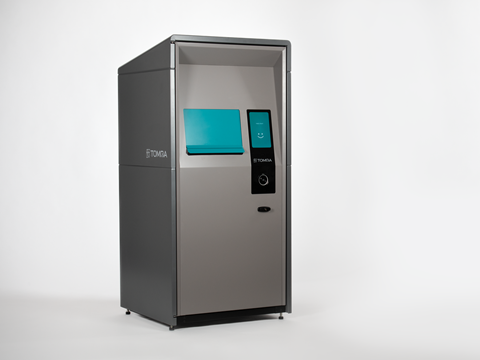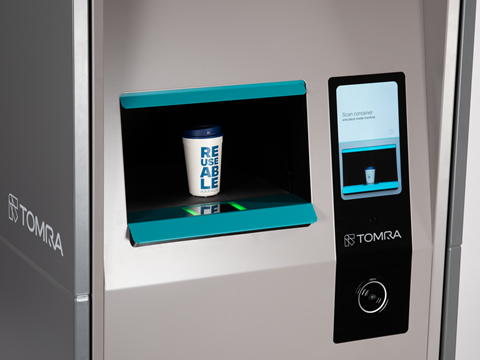
TOMRA Reuse unveiled its Reuse Collection Point (RCP) capable of handling food packaging at the Reuse Economy Expo, designed to be a a fully integrated platform for collecting, transporting, sanitizing, quality-assuring and redistributing reusable takeaway containers.
TOMRA’s new return vending machine (RVM) Rotake system relies on serialized QR codes to track an item’s journey from distribution in cafés, bars and restaurants in QR-coded reusable containers through the return process by consumers via RCPs, cleaning and inspection, up to the redeployment of approved containers to participating outlets through distribution partners, as a recurring on-demand subscription via an online portal.
By comparing the number of rotations against single-use alternatives, the system is said to deliver hard data on carbon and waste savings. Since the launch of TOMRA’s city-wide cup pilot in Aarhus, Denmark in January 2024, consumers have paid a DKK 5 deposit for reusable cups, redeemable at collection points across the city centre. TOMRA states that more than 1 million cups have been returned to date, yielding an 85% redemption rate and substantial reductions in single-use waste.

In addition to more city pilots, TOMRA is fast-tracking Rotake Venue, optimized for large events and stadiums with ‘high throughput and instant collection needs’. The company also introduced its T70 Dual BottleGlide at the Expo, a customized solution developed to support the CITEO ReUse project - a national reuse system for food packaging in large and medium-sized supermarkets in France - specifically adapted for the return of reusable glass bottles. The zigzag bottle return system is designed to slow and align bottles to prevent damage, allowing them to be sanitized and reused by producers instead of being downcycled or discarded.
At the start of 2025 TOMRA introduced the TOMRA B7, the first TriSort RVM in its Basic Line, designed to make drinks container recycling more accessible and efficient for small businesses and markets new to deposit return schemes (DRSs). The machine can accept up to three types of containers including PET, cans, glass bottles and refillable bottles.
More recently, the company developed an AI-based technology for upgrading wrought aluminium scrap and producing high purity fractions, GAINnext, designed for use by aluminium scrap processors and recyclers. The new technology recovers low alloy cast from the wrought fraction and reduces alloying elements such as silicone.
If you liked this story, you might also enjoy:
The ultimate guide to the Packaging and Packaging Waste Regulation in 2025
How are the top brands progressing on packaging sustainability?
Everything you need to know about global packaging sustainability regulation in 2025
The key to increasing the use of reusable packaging in supermarkets


















No comments yet